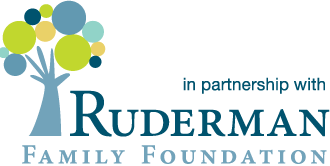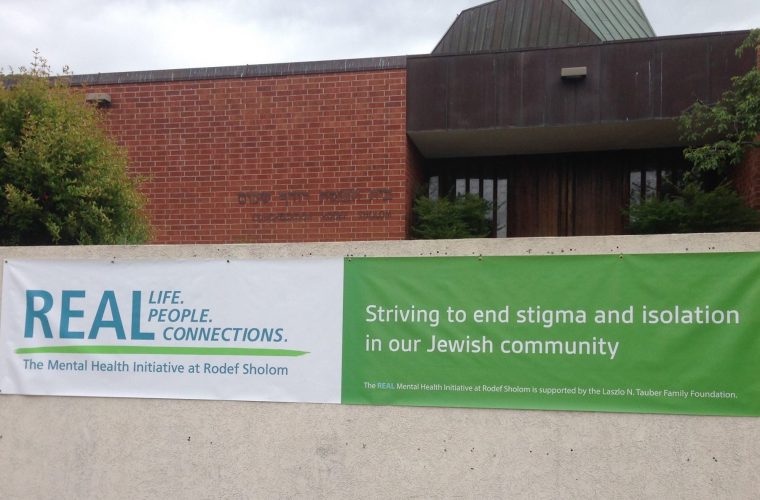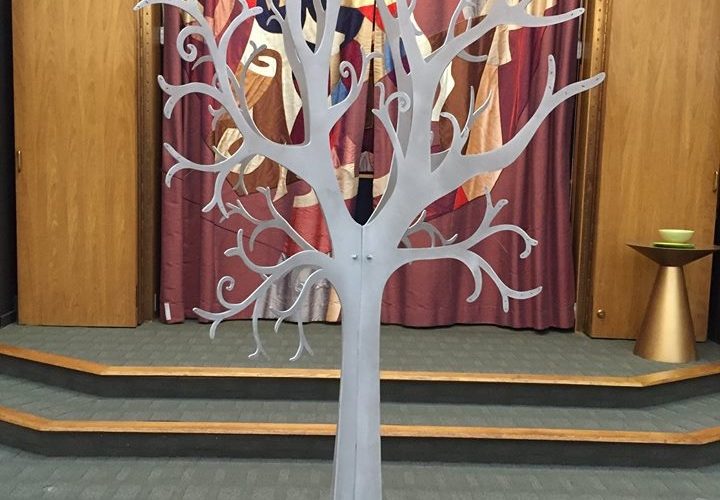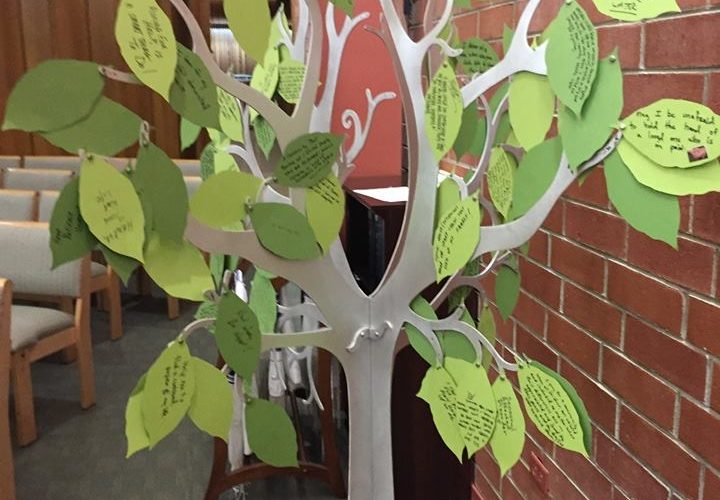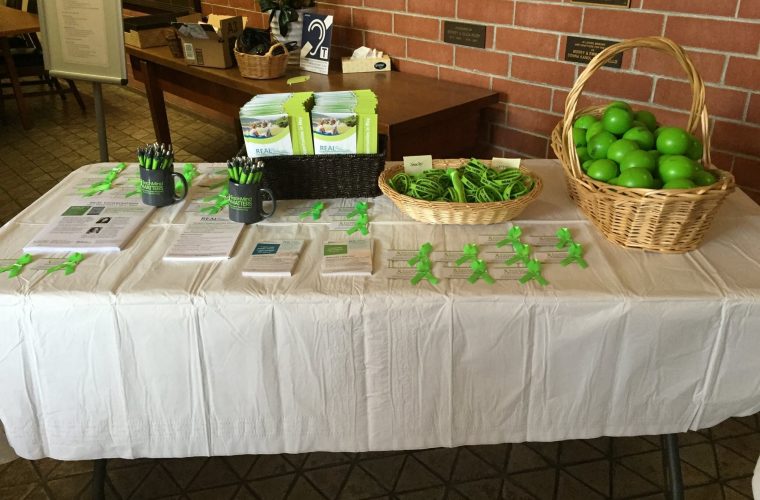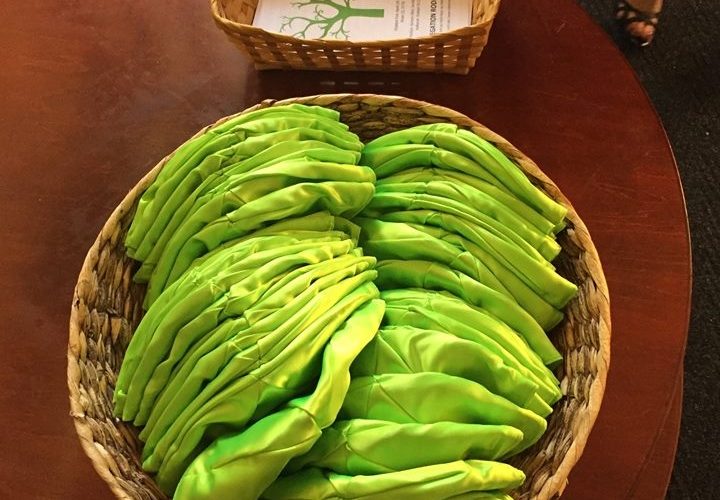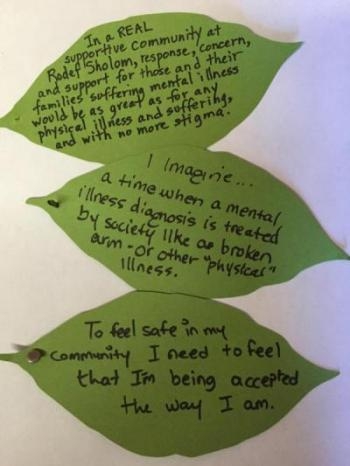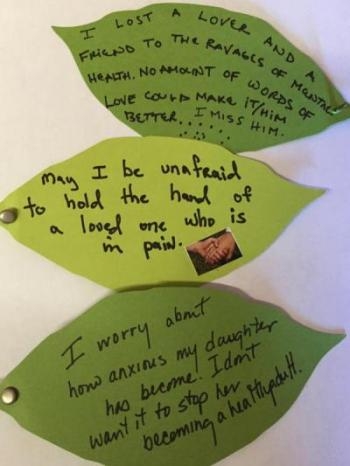Areas of Inclusion: Adults in Communal Life, Advocacy & Community Partnerships, Mental Health, and Youth Group, High School, and College Programming
Contact Information
JoAnne Forman, REAL Mental Health Initiative Program Coordinator
415-479-3441 ext. 3011
Inclusion Programming
Does this congregation have an inclusion committee?
Yes
Developing Our Program
Congregation Rodef Sholom is dedicated to caring for and supporting all members of our community in times of need and in times of joy. Our caring community has established comprehensive practices to ensure all who enter our community feel at home, accepted and welcomed. We feed and care for the sick and elderly, and actively integrate awareness and inclusion of interfaith, LGBTQ, and those with disabilities. We offer structures that support any who are suffering, and strive to support all those in need. However, a more formal awareness and response to the unique circumstances and needs of those suffering from mental illness was missing.
This awareness began in 2014 in response to a Kol Nidre sermon delivered by our Senior Rabbi Stacy Friedman that focused on stigma reduction and inclusion of those with or caring for loved ones with mental illness.
After the sermon, we held two congregation-wide meetings to brainstorm ways to approach the issues of mental illness in our community. Additionally, many congregants came to our clergy to discuss ways that mental illness have touched their family. With clergy and staff leadership, a volunteer steering committee was formed, and a mission statement was drafted for the Mental Health Initiative (MHI): to end isolation and stigma of mental illness in our community. Three lay-led teams were initially formed to focus on specific areas for action: education; youth; and community connection. Last year, the Mental Health Initiative was formally branded as REAL - Real Life, Real People, Real Connections.
Program Development Links
Number of people involved in the effort: 300
Involving People with Disabilities
Our REAL Mental Health committees include congregants both with and without lived experience.
Funding This Effort
The REAL Mental Health Initiative is supported by The Laszlo N. Tauber Family Foundation. This funding has allowed us to hire a Mental Health Initiative Program Coordinator to oversee this program.
Funding Links
Helpful Agencies & Organizations
We worked with a stigma reduction consultant, Lisa Smusz from Smusz & Associates consulting to learn the best practices in stigma reduction. We have also worked with Each Mind Matters - California's Mental Health Movement, and partnered with local agencies including National Alliance on Mental Illness (NAMI), Bay Area Jewish Healing Center, Buckelew, and Jewish Family and Children's Services (JFCS).
List of Helpful Agencies & Organizations
Spreading Awareness About Our Work
Outreach is an important part of our Initiative. Over the past three years our Mental Health Initiative has become well-known in our Rodef Sholom community and beyond. This has been achieved in many ways.
- Each bi-monthly issue of the Voice (our newsletter) includes an update on the activities of the REAL MHI.
- In promoting our annual speaker series, we have reached out to the larger community through synagogue promotion, advertisements in local Marin newspapers, direct mail, email, social media, and through partnership with local agencies
- The REAL Mental Health Initiative has formed new community partnerships (Center for Open Recovery in SF, Spectrum LGBT services, Beyond Differences) and has strengthened its existing partnerships (NAMI Marin, Buckelew, JFCS)
- We routinely send press releases to local papers letting them know about our programs and events
- Our Program Coordinator and Director of Synagogue Engagement regularly seek out opportunities to present at state-wide conferences to talk about the work we are doing
- Each month congregants and broader community members contact the MHI REAL Program Coordinator and Rodef Sholom because they have heard about the work we are doing and are interested in getting involved. These contacts have included:
o Congregants who are interested in joining one of our existing MHI teams
o Congregants wishing to create new committees focused on new aspects of the MHI
o Members of other synagogues reaching out to learn more about our speaker series
o Calls from congregants looking for mental health resources for family members
o Therapists within the community interested in partnering with us and being a referral source
o Congregants asking for space to host an Al-Anon meeting
o NAMI Marin, asking us to host another 12-week family-to-family course next year
o Many congregants reaching out to clergy and us in response to this initiative
- Each May, REAL plans community-wide events in honor of Mental Health Awareness Month. In 2017, this included:
o A mental health-focused community-wide shabbat service, including clergy sermon focused on mental health awareness and guest speaker(s) with lived experience sharing their own stories. The service was advertised to the full community to continue to expand the reach of the REAL MHI.
o Commemoration of the anniversary of our Tree For Life, the interactive art installation unveiled at our 2016 Mental Health Shabbat to promote community engagement and stigma reduction. The tree has grown to be a part of our synagogue's aesthetic and serves as a symbol of sharing, connection, and openness.
o Hosting the premiere Marin County screening of The S Word Documentary: Opening the Conversation about Suicide at the Lark Theater in Larkspur on May 4h. The film is a celebration of stories of people with lived experience with suicide. The screening includes an introduction and audience Q & A with the film's director, Lisa Klein. The Lark's assistance with promotion - advertising the film to its website, including it in their newsletter and putting the film on their marquis - helps increase REAL's visibility within the greater Marin community.
o Mental Health Awareness Month community gathering featuring Hannah Hart, wildly popular YouTube personality and author of Buffering: Unshared Tales of a Life Fully Loaded. Hannah is a digital influencer with more than 2.3 million followers, providing REAL with an opportunity to spread our message to a new and bigger cross-section of our community.
Links About Spreading Awareness
Process & Sharing
Marketing Documents Indicating Our Commitment to Inclusion
History, Materials & Processes that Guided Our Approach
We are happy to share our process with any congregation who is interested in this work.
History, Materials & Process Documents
Evidence of Successful Inclusion Efforts
Since Rabbi Stacy Friedman's September 2014 sermon, many congregants have come forward to publicly shared personal stories about their experience with mental illness or mental health challenges. These shared stories have made an incredible impact on all who were in attendance.
Rabbi Elana Rosen-Brown spoke to the congregation during a Friday night service about her own "dark nights of the soul," demonstrating again for our community the power of vulnerability and our congregation's capacity and hunger for connection, and ability to create a safe space for honest emotions. Like Rabbi Friedman's sermon, Rabbi Elana Rosen-Brown's sermon touched our congregation and inspired many congregants to reach out with their own stories of darkness. Along with Rabbi Elana, another congregant shared about her experience working in the mental health field. At High Holiday services last year, three congregants chose to share their stories. One congregant spoke about her experience with her adult son's mental illness and how it has impacted her own life. Another congregant shared her powerful story of alcohol addiction and recovery. A third congregant shared her story of hardship and being grateful for where she is today.
These congregants who spoke out publicly have reported that they received tremendous positive and appreciative feedback about their strength, courage, and impact on others. Other congregants have come forward since and offered to tell their own story as we continue to plan safe, supportive opportunities to share these moving stories of personal experience.
There has been a palpable shift in the way our congregants think and talk about mental health in our congregation. More congregants are coming forward to the clergy and Rodef Sholom staff to speak about the mental health challenges of themselves or a family member. One long-time congregant who once said that Rodef Sholom did not feel like a place she could come for support around her child's mental illness is now running our REAL Parent peer-support (along with Rabbi Stacy's spiritual guidance), ensuring that other parents like her are able to find the support they need at Rodef Sholom.
In 2016, The REAL MHI launched a peer support program called REAL Allies, a program created by congregants for congregants to increase support and connection opportunities within our community. Allies are volunteers who have "been through it" and want to help other congregants. Each month there are new volunteers who come forward to tell their personal stories in order to be able to support others, demonstrating the impact that the REAL MHI is having on our congregation.
Evidentiary Documents
Evidence of Changing Attitudes
The REAL Mental Health Initiative is having a real impact on our congregation.
Stigma reduction happens when we gather people together to fight against it - whether we suffer from mental illness, love someone who does, or simply care about being an ally to the cause. By uniting together to reduce the stigma of mental illness, we are creating transformation - strengthening our community, changing the system, and helping to make Rodef Sholom a safe place where everyone - no matter what - feels welcome and comfortable.
We started with incremental organizational changes by creating teams to focus on different areas of the initiative. Motivated, invested members of our congregation came together to share their stories of how issues of mental health had affected them and what their hopes were for how the synagogue could change to be more inclusive, welcoming, and safe. We received enthusiastic participation and feedback from all areas of our synagogue and community - our clergy, members of our staff, congregants, and mental health professionals. Our work and our impact on our community continues to grow each year. We are educating ourselves and our community about mental health and mental illness. We are developing systems for staff, professionals and members to support those whose lives have faced challenges that surround mental illness. And we have opened a conversation within our community that builds awareness of mental health as part of our collective experience.
How We're Using and Sharing the Disabilities Inclusion Learning Center
We have participated in the live webinars, and will continue to do so. We also presented on a panel at URJ Biennial in 2017.
Future Inclusion Efforts
We are continually looking forward to ways we can grow the Initiative. Our plans include a collaboration with our local Jewish Healing Center to create a large-scale voluntary opportunity for our members to engage in a story-telling process about their own lived experience. In addition, we are in the process of working with our 6th - 12th graders to help them create their own REAL Teen program, with the goal to support the overall MHI mission without drawing overt attention to mental illness. Instead, the REAL Teen program will focus on themes of increasing connection, community and safety within our Rodef Sholom community and beyond. As part of this team, teens will learn to look out for one another in group settings, by taking it upon themselves to create a welcoming environment for everyone who attends a youth program.
We hope to continue to work to END THE STIGMA AND ISOLATION OF MENTAL ILLNESS IN THE JEWISH COMMUNITY as it is our mission statement. We are here to help other congregations to do the same.

